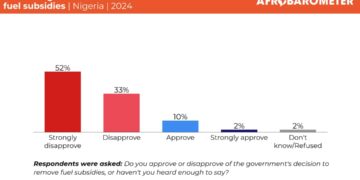By Daniel Ighakpe
“Foolish is the man who never reads a newspaper; even more foolish is the man who believes what he reads just because it is in the newspaper.” – August von Schlözer, German historian and journalist of the late 18th century.
The newspaper is an important document which can be referred to as a powerhouse of information.
It is important because it keeps us informed about current developments in our environment and in other parts of the world.
Over the past few centuries, newspapers have shaped culture, influenced politics, played an important role in business, and affected the daily lives of millions of people.
However, newspaper reading is becoming a dying habit, especially as the world moves towards digitalization.
You can now get virtually everything on your phones and computers, so people are not into newspaper reading as they were before. Most importantly, people are themselves running out of the habit of reading itself.
The internet has made it worse as now there is a video for virtually everything. People will not mind watching a five-minute video, but will however not prefer to read a five-minute long article.
In Nigeria, the life of newspapers started in the 19th century when the European Missioner from the Presbyterian Church, Rev. Henry Townsend established the first printing press in 1854. According to him: “My objective is to get the people to read and beget the habit of seeking information by reading.”
History has it that five years later, on November 23, 1859, the first edition of Nigeria’s first newspaper, “Iwe Irohin,” came out.
The newspaper was published every fifteen days and sold for 120 cowries. It was highly patronized by the few literate people in Yoruba land; and the circulation of the paper was around 3,000 at that time.
Today, there are several newspapers and newspaper publishing firms in Nigeria.
And with the improvement in printing technology and other Information and Communication Technologies (ICTs), newspaper production has become a lot easier and faster, with more high-quality output. Nigerian newspapers are now not only read in homes, offices and on the streets, but also online.
Some are published on a daily basis, others come out weekly, while others appear fortnightly.
They publish news on all national and local events, politics, sports, crime, obituaries, and business.
Feature stories, reports from foreign countries, and interviews with prominent figures and experts on particular subjects are also published.
Most newspapers also provide an editorial page as well as columns for opinion articles (Op-Eds)/ criticism articles; also weather news; classified ads; forecasts; comic strips; cartoons; and so on.
All these and more are covered in Nigerian newspapers. There are now also newspapers that are specifically designated “online newspapers,” which exist only on the internet, without a hard-copy, printed version.
Today, newspapers compete with electronic media – radio, television, and the internet. Nevertheless, in spite of the advantages which electronic media have over the print media, the newspaper business continues to thrive.
Other electronic broadcast media even complement the use of newspapers for dissemination of information via press review.
The newspaper continues to function as a unique medium of mass communication.
Apart from its traditional function of informing, educating, persuading and entertaining the masses, newspapers play other functions, such as: Providing better interpretation of the stories in the news; Ensuring easy understanding and retention of media content; Ensuring easier storage and retrieval of information, which one can refer to repeatedly; Serving as a viable tool for mass education and mass Literacy by motivating and encouraging good reading habits among the masses in the society.
However, it is wise to examine the news with healthy skepticism. Everybody makes mistakes, even the most honest and skilled professionals.
Sometimes, journalists must contend with unreliable news stories. At times, hoaxes are fed to the press.
Even well-intentioned journalists do not always get the story right. They usually work at a quick pace.
So sometimes they are not able to report a well-researched story. Also, manipulation of the news may occur, even in areas where freedom of the press is enjoyed.
Nevertheless, although various factors can prevent newspapers from being entirely objective, they still can help us stay informed about what is going on in the world – even while we make allowances for its limitations.
What are the benefits of reading the newspaper? Reading newspapers is a good habit that can provide a great sense of educational value. It helps us get acquainted with the current affairs of the world.
It carries information about the economy, entertainment, sports, business, industry, trade and commerce. Cultivating the habit of reading newspapers will not only enhance one’s knowledge about general information, but it will likewise improve one’s language skills and vocabulary.
In addition, a person who reads newspapers can speak fluently on various topics. They can socialize better, as they are well aware of the most common topics currently on the minds of people.
Similarly, it also saves us from getting bored. Newspaper reading can also result in opening doors to new employment opportunities.
Reliable companies post their advertisements in the newspapers for business and employment.
So, it is a good place to search for jobs. Furthermore, we can easily promote our brands, products and services with the help of newspapers.
The value of reading a newspaper extends far beyond what has been mentioned above.
If you regularly read a well-written, well-balanced newspaper, it could also help stimulate brain function for improved performance in the following areas: critical thinking skills, balanced viewpoints, enhanced cognition (the more the mind is exercised, the stronger and more flexible it becomes), and more.
So, in spite of all the odds against the newspaper as a medium of mass communication, it continues to compete favourably with other media of mass communication because of its unique advantages.
Therefore, conscious effort needs to be made at ensuring that the newspaper continues to be well-produced to reflect its enduring advantages.








































